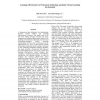Free Online Productivity Tools
i2Speak
i2Symbol
i2OCR
iTex2Img
iWeb2Print
iWeb2Shot
i2Type
iPdf2Split
iPdf2Merge
i2Bopomofo
i2Arabic
i2Style
i2Image
i2PDF
iLatex2Rtf
Sci2ools
102
click to vote
HICSS
2005
IEEE
2005
IEEE
Learning Effectiveness in Web-Based Technology-Mediated Virtual Learning Environment
A framework that delineates the relationships between learner control and learning effectiveness is absent. This study aims to fill this void. Unlike previous research, this study compares the learning effectiveness between two learning environments: traditional classroom and Technology-mediated Virtual Learning Environment (TVLE). Our work focuses on the effectiveness of a TVLE in the context of basic information technology skills training. Grounded in the technology-mediated learning literature, this study presents a framework that addresses the relationship between the learner control and learning effectiveness, which contains four categories: learning achievement, self-efficacy, satisfaction, and learning climate. In order to compare the learning effectiveness under traditional classroom and TVLE, we conducted a field experiment. Data were collected from a junior high school of Taiwan. A total of 210 usable responses were analyzed. We identified four results from this study. (1) S...
Biometrics | HICSS 2005 | Learning Effectiveness | Learning Environment | System Sciences | Virtual Learning Environment |
Related Content
| Added | 24 Jun 2010 |
| Updated | 24 Jun 2010 |
| Type | Conference |
| Year | 2005 |
| Where | HICSS |
| Authors | Shih-Wei Chou, Chien-Hung Liu |
Comments (0)

